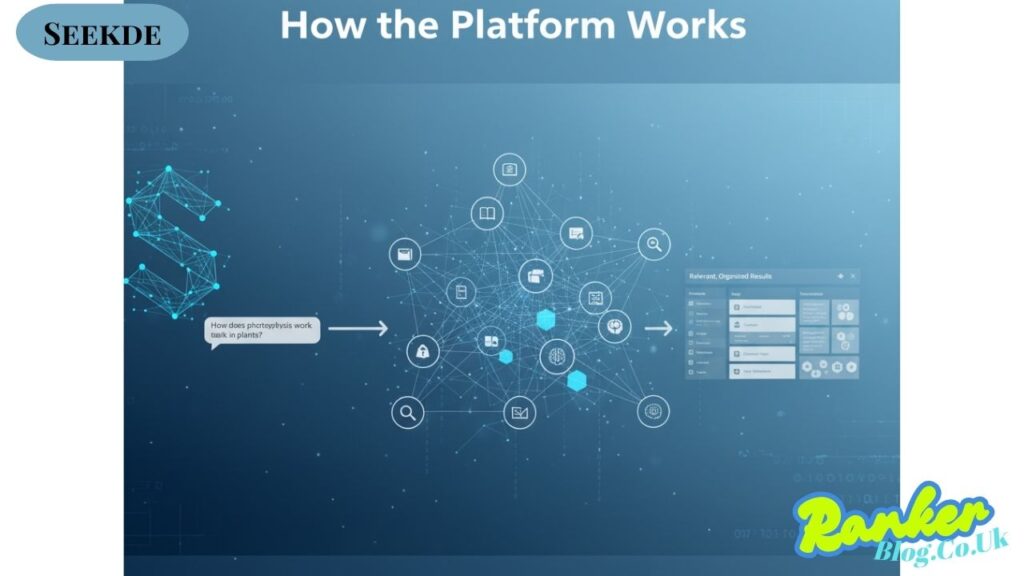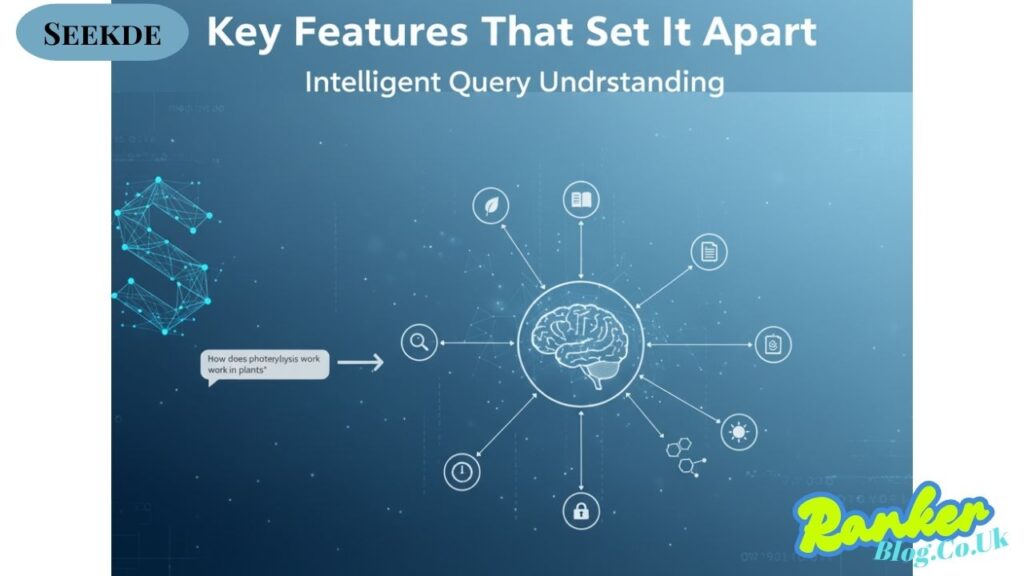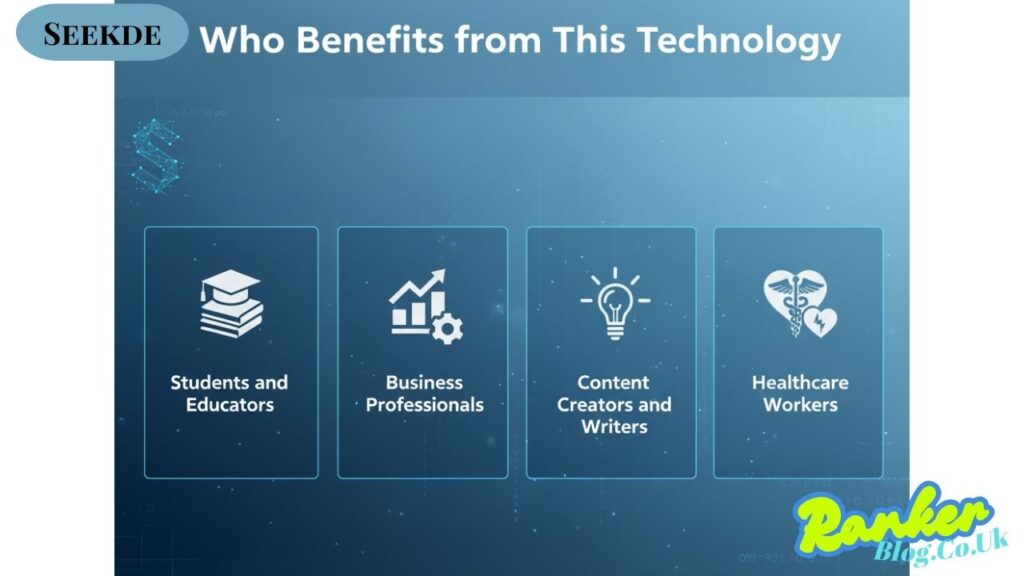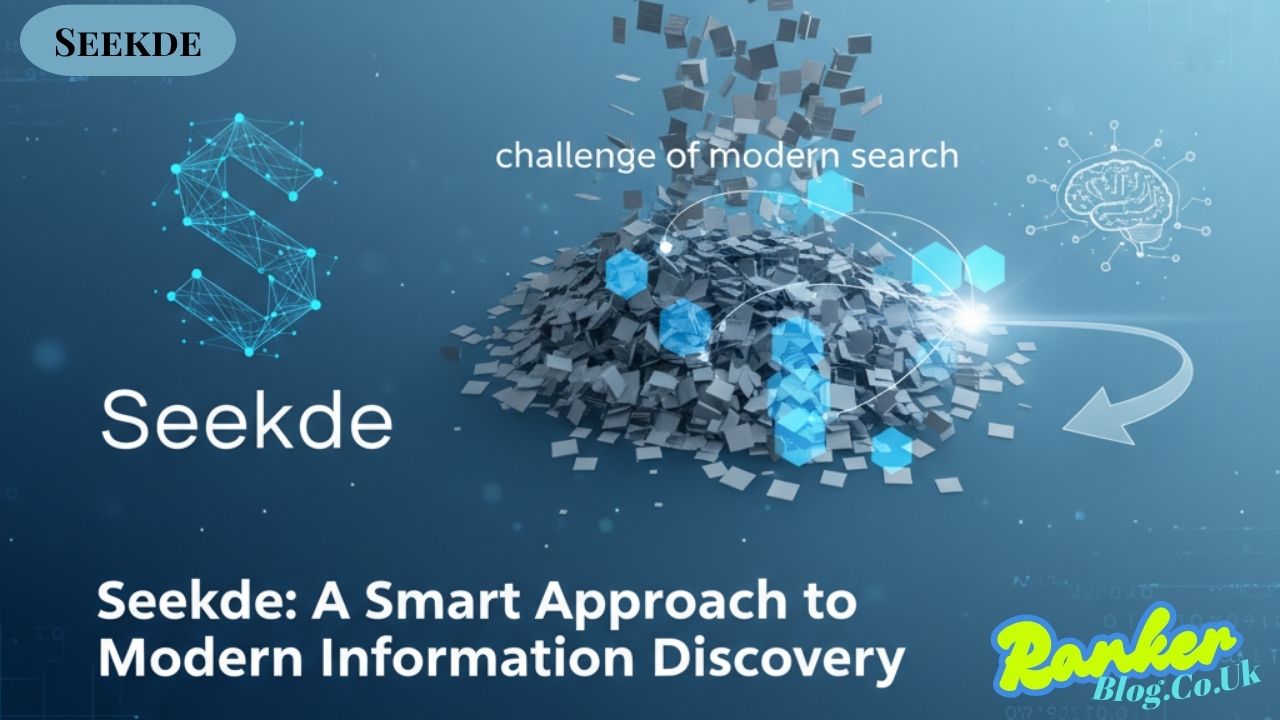Understanding the Challenge of Modern Search
Finding information online can be a challenge. When you type a question, you see millions of answers. It is necessary to open several websites to obtain a precise answer. This requires both time and energy.
Traditional search engines inundate users with numerous links, leaving them to sift through pages of results. People often feel overwhelmed by the sheer volume of information available. The process becomes tedious, especially when looking for specific insights or connected knowledge.
Students spend hours jumping between sources for research projects. Professionals waste valuable time searching for relevant data. Researchers struggle to identify patterns across multiple documents. The need for a better solution has never been more apparent.
What Makes Seekde Different
Seekde is a brand new approach to search. It’s a clever search engine designed for the current world. It focuses on providing answers, not just hyperlinks.
Unlike conventional platforms that simply list websites, this innovative tool understands context and relationships. It organizes information in a meaningful way, helping users discover connections they might have otherwise missed. The platform transforms how people interact with digital knowledge.
The system goes beyond basic keyword matching. It analyzes intent, recognizes patterns, and presents information through intuitive visualizations. Users receive organized insights rather than random collections of links. This fundamental shift saves countless hours while improving the quality of research.
How the Platform Works

The technology behind this discovery tool relies on advanced algorithms and intelligent mapping. When someone enters a query, the system doesn’t just search for matching words; it also considers the context in which those words are used. Instead, it comprehends the underlying question and explores related concepts.
The platform builds knowledge graphs that illustrate the connections between different pieces of information. These visual representations help users quickly grasp complex topics. Relationships between ideas become clear, making it easier to grasp comprehensive subject matter.
Natural language processing enables the tool to interpret questions in the same way humans ask them. There’s no need to use specific keywords or Boolean operators. People can type conversational queries and receive relevant, organized results. The interface learns from user behavior, becoming more helpful over time.
Key Features That Set It Apart

Intelligent Query Understanding
The search system recognizes what users truly want to know. It considers context, previous searches, and common patterns in similar queries. This understanding yields more accurate results that align with actual needs, rather than merely matching words.
Visual Knowledge Mapping
One of the most powerful features is the ability to see information relationships. The platform creates interactive maps showing how concepts connect. Users can explore these visual representations, discovering new pathways through complex subjects.
Organized Discovery Experience
Results are presented in a structured format that is easy to understand. Instead of endless scrolling through blue links, users see categorized information with clear relevance indicators. The organization reduces cognitive load and speeds up the research process.
Context-Aware Results
The system remembers what users are working on and provides contextually relevant suggestions. This awareness helps maintain focus and discover related information without having to start new searches from scratch.
Who Benefits from This Technology

Students and Educators
Academic research becomes more efficient with organized discovery tools. Students can explore topics deeply while understanding how different concepts relate. Educators find it easier to prepare comprehensive lesson materials that show connections between subjects.
Business Professionals
Market researchers, strategists, and analysts benefit from the ability to quickly identify trends and patterns. The platform enables them to make informed decisions based on comprehensive data analysis, rather than relying on fragmented information.
Content Creators and Writers
People who create content need reliable research tools. This platform helps them find accurate information, verify facts, and discover unique angles for their work. The visual mapping feature sparks creative connections between ideas.
Healthcare Workers
Medical professionals can explore treatment options, research studies, and clinical data more efficiently. The ability to identify relationships between symptoms, treatments, and outcomes enhances patient care through more informed decision-making.
Practical Applications Across Industries
Education Sector
Schools and universities are adopting more innovative discovery methods for library systems and student research. The technology supports project-based learning by helping students find and organize source material effectively.
Corporate Research
Companies use advanced discovery platforms for competitive intelligence and market analysis. The ability to map industry trends and identify emerging patterns provides strategic advantages.
Legal and Compliance
Legal professionals need to find precedents and related cases quickly. Organized search with relationship mapping helps them build stronger arguments and ensure comprehensive case preparation.
Scientific Research
Researchers across disciplines benefit from tools that show connections between studies. Cross-referencing papers, identifying gaps in the literature, and discovering unexpected correlations become manageable tasks.
The Technology Behind Smart Discovery
Modern discovery platforms leverage artificial intelligence and machine learning. These technologies enable systems to understand natural language, recognize patterns, and improve through use. The algorithms continuously refine their understanding of how information relates.
Data processing happens in real-time, ensuring users receive current information. The infrastructure scales to handle millions of queries while maintaining fast response times. Security measures protect user privacy and ensure data integrity.
Integration capabilities allow these platforms to work with existing tools and databases. APIs enable developers to incorporate brilliant discovery features into custom applications. This flexibility makes the technology accessible across different use cases.
Advantages Over Traditional Search
Traditional search engines excel at finding specific websites but struggle with complex queries requiring synthesis. Innovative discovery platforms address this limitation by organizing information around concepts rather than keywords.
Time savings represent a significant advantage. Users spend less time filtering irrelevant results and more time engaging with helpful information. The organized presentation reduces the mental effort required to process search results.
Discovering unexpected connections is another key benefit. When information appears in relationship maps, users notice patterns and relationships they might have overlooked. This serendipitous discovery often leads to breakthrough insights.
Getting Started with Modern Discovery Tools
Beginning with a new platform requires a minimal learning curve. Most smart discovery tools feature intuitive interfaces that feel familiar to anyone who has used search engines. The difference becomes apparent when results appear organized and connected.
Begin by entering questions naturally, as if you were asking another person. The system interprets conversational language and provides relevant answers. Explore the visual maps to understand how topics relate. Click on the connected concepts to explore related subjects in more depth.
Take advantage of personalization features by creating an account. Saved searches, bookmarked discoveries, and learning preferences make the experience more tailored over time. Many platforms offer tutorials and guides to help users maximize their effectiveness.
Privacy and Security Considerations
Modern users rightfully care about data privacy. Reputable discovery platforms implement strong security measures to protect user information. Encryption, secure servers, and transparent privacy policies ensure data remains safe.
Understanding how platforms utilize search data enables users to make informed choices. Some tools anonymize queries to improve algorithms without compromising individual privacy. Reading the terms of service clarifies what information is collected and how it’s used.
Many platforms offer controls allowing users to manage their data. Options to delete search history, opt out of personalization, or limit data collection provide flexibility. Choosing tools that respect privacy demonstrates a commitment to user rights.
The Future of Information Discovery
Discovery technology continues evolving rapidly. Artificial intelligence advances enable an even more sophisticated understanding of user needs. Future systems may anticipate users’ information needs before they are explicitly searched.
Integration with voice assistants and augmented reality could transform how people access information. Imagine asking questions aloud and seeing visual knowledge maps appear in your field of view. Such innovations would make discovery seamless and intuitive.
Collaborative discovery features are likely to become more prominent. Teams working together could share knowledge maps, annotate findings, and build collective understanding. This social dimension would enhance learning and research across organizations.
Making the Switch to Smarter Search
Transitioning from traditional search to modern discovery tools requires openness to new approaches. The initial difference in result presentation might seem unusual, but most users quickly appreciate the organized format.
Give the technology a fair trial by using it for various tasks. Try it for quick fact-checking, deep research, and exploratory learning. Compare the experience with traditional search to notice the efficiency gains.
Explore advanced features gradually. Start with basic searches to build comfort, then experiment with visual mapping and related concept exploration. Most users find that once they experience organized discovery, returning to simple link lists feels limiting.
Overcoming Common Challenges
Some users initially find visual knowledge maps overwhelming. Remember that these representations can be explored gradually. Focus on the central topic first, then branch out to related concepts as needed.
Trusting algorithmically organized results takes adjustment. The system’s ability to determine relevance improves with use. Providing feedback when results fall short helps the platform learn individual preferences.
Integration with existing workflows may require some planning. Identify where discovery tools fit best in your process. Many users find that combining traditional and modern search methods works well during transition periods.
Measuring the Impact
Quantifying time saved through better discovery tools demonstrates their value. Track how long research tasks take before and after adoption. Many users report significant reductions in time spent finding relevant information.
Quality improvements matter as much as speed. Notice whether the information found is more relevant and comprehensive. Better discovery tools often lead to higher-quality work products because research is more thorough and extensive.
User satisfaction typically increases with organized discovery. Less frustration, fewer dead ends, and more “aha moments” make the research process enjoyable rather than tedious. This improved experience often leads to a deeper engagement with the subject.
Conclusion: Embracing Modern Discovery
This guide will explain everything you need to know about Seekde. Discover how it works and why it is crucial for the future of online information retrieval.
The evolution from simple search to intelligent discovery represents a significant advancement in how humans interact with information. Platforms that organize knowledge, reveal connections, and provide context-aware results empower users to work smarter.
Whether for education, professional research, or personal learning, modern discovery tools offer clear advantages. The time saved, connections discovered, and insights gained make these platforms valuable for anyone who regularly seeks information online.
As technology continues advancing, those who adopt more innovative discovery methods will find themselves better equipped to navigate the expanding digital universe. The future belongs to tools that not only find information but also help users truly understand it.
Also Read: Scoopupdates .com Your Ultimate Multi-Niche Content Platform for Breaking News and Trending Topics

